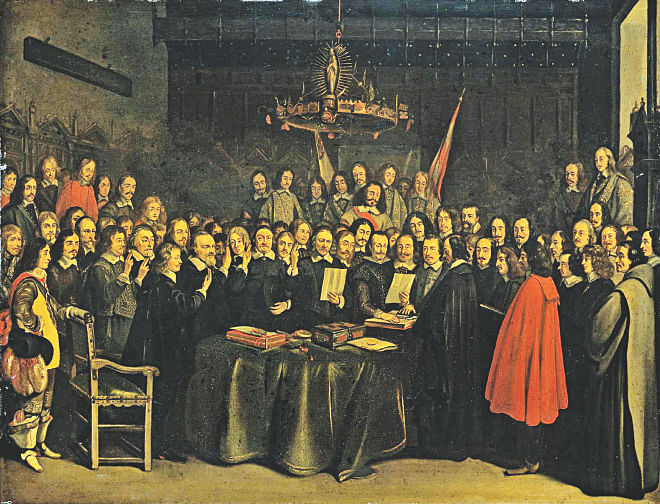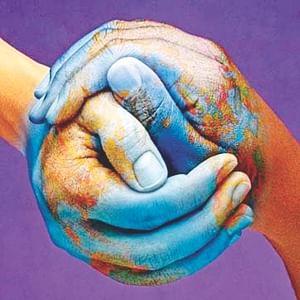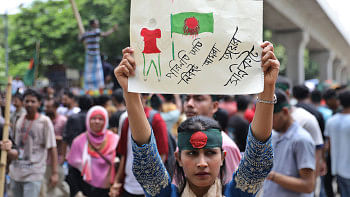Globalisation vs national security

The origin of the modern concept of "national security" as a philosophy of maintaining a stable nation state can be traced to the Peace of Westphalia, wherein the concept of a sovereign state, ruled by a sovereign, became the basis of a new international order of nation states. Ever since then, the concept of national security has been a popular idea and taken as international discourse, more prominently in the west. National security means the use of various instruments of national power to secure own interests. With the Initial focus on military might, national security now encompasses a broad range of facets like economy, diplomacy, politics and the values espoused by the national society. Each state focuses on own national interests and uses all of its military and non-military power to ensure national security. The growth of such national power like military, economy, diplomacy or politics does not depend on a nation's internal dynamics and challenges only. The demise of the cold war has brought about a sea of change in the world's politico-security environment. The impact of geopolitics, geo-economics, environment, threats and capabilities of other states do matter for each nation to formulate its national security architecture. Threats of national security, therefore, emanate from both within and outside. Accordingly, each state develops a capability in all the tools of national power to protect its own security from threats either inside or outside. Every state has the right to ensure its own security, but an increase in one state's security decreases the security of others. The paradox lives within the cleavage of national and international security, which causes imbalance in the international order.

National security and international security and order are intertwined. The horrendous memories of the destruction of World Wars and fear of nuclear war have pushed the world to allow more space for international security. The world is looking at methods other than war to ensure national prosperity as well as maintaining international security. Liberal forms of democratic governments have been the only choice to avoid war, and to pursue prosperity through cooperation. In the process, globalization turned out to be a new idea to effect interaction amongst the nations in realizing their national agenda as well as maintaining international security.
Countries agreed to adapt themselves to the process of globalization by choice or none with a common value, approach and attitude towards global problem under the rule of international law. The moral commitment of states, thus, helped in the fusion of national and international security to build a peaceful world and an enlightened world order. This has reduced the chances of direct conflict amongst countries and opened more space for cooperation. Despite the absence of direct conflict of a greater magnitude, there is dormant tension in different fields as national security in some countries find more dominant place than the idea of globalization. Interestingly, countries that promote globalization for their own benefits are found extremely sensitive in articulating their own national security doctrine notwithstanding the fact that their efforts to ensure national security may violate the principle of globalization and international security.
The countries particularly in the developed world promoting globalization, do also take a lot of interest in national security issues themselves. It is hard to understand why they promote globalization so strongly, while again underscore the national security equally. Probably the reason is that national security draws its identity from the nation state concept, while globalization goes beyond the border from the human security perspective. Many issues commonly accepted or perceived as global problems find much narrower space when the same are included as national security agenda in their national security doctrine. For instance, issues like economic prosperity inserted as the national value, or energy/water security as national interest constrict the wider perspective of the global problem into much parochial narrow national agenda.

Though, every nation defines economic prosperity as its top priority national interest, it makes a huge difference to different countries. When a stronger country puts economic prosperity as its national interest, it does have to go beyond its own border and exploit the economy or markets of weaker countries. The weaker country can only depend on the process of globalization to benefit with hardship, and may seldom succeed. Contrarily, the stronger country can ensure economic prosperity quite easily to its own people at the cost of the economic manipulation of weaker countries.
Countries agree in the reduction of carbon emission to ensure environmental security. But many of the developed countries do not include reduction of carbon emission in their national security doctrine as that may hinder their national interests. There is no alternative to the use of carbon emitting energy to continue the developmental cycle for national prosperity of the developed countries. The environmental security articulated by the low lying countries may bear no significance. The plights, which may result from environmental degradation to the countries living in the lower plains, may rarely move the countries living in the upper plains to care for. Though there is no direct conflict between countries, clash in the spirit of greater security accumulates eventually.
In the field of environmental security, water is another important agenda of the national security for countries who share common rivers. When the stronger country, as an upper riparian, secures water for itself; it causes insecurity for weaker and lower riparian countries. The rivers shared among China, India and Bangladesh are a case in point. Countries have internal pressure to address water more as a point of national security, despite that being a common concern for all of them. It may be rationale for them to secure water for their own citizens, but at the cost of insecurity to the other countries. It is hard to make a happy balance between globalization and national security of an issue which has global concern as well as concern for national security. Thus, though the generous philosophy of globalization is violated, national security of the stronger country is ensured. The weaker country is left with only option to adapt to the insensibility of globalization contrary to its generous principles.
In the cooperative global world, threats to traditional security have exponentially reduced. Intra-state war or war against non-state actors has replaced the traditional inter-state war at large. The military, around the world, though trained to fight against the threat of traditional security, has different perspectives of threat perception. There is a paradigm shift in the security dynamics, which brings forth the question of redefining the role, training objectives of military, and expenditures on defence. Many of the western countries were pioneers in this line of thought and realigned their military accordingly. But there is exception in the security perception of global or rising economic powers. From the notion of economic security, renewed threats to traditional security reappear in them. In one hand, the stronger countries resort to the policy prescription of the global economic institutions to protect their own economy, and continue to expand the military in both size and budget for economic security on the other hand. The countries that downsized their military forces resort to collective security arrangements to secure the national economic interests. The weaker countries struggle with the global economic policies to benefit equally like the stronger countries. Insensitivity of the stronger countries to the economic deprivation of the weaker countries helps germinate seeds for greater conflicts in the process. The weaker countries are in greater dilemma to identify the real threats, size of military forces or need for military budget, and focus on training. The sense of globalization and national security among countries fall in contrasting perspectives so far the use of military is concerned.

On another count, even within a country, be it strong or weak, the national security issues find difficulties to accommodate the national interests to comfort all her stakes. However carefully formulated, national security doctrine does not reflect the real safeguard of national interests or calibration of national values. For instance, countries articulate promotion of values as national interests in their national security doctrine. The values are generally drawn from the political, economic, social or cultural perspectives, where diversity is obvious. Jaffry Sach, in his book 'Price of Civilization', narrates immense diversity in the various values of the American society in its geographic divide of Sunbelt and Snowbelt. On the economic values, the Snowbelt believes in more role of government in the state affairs, while the Sunbelt believes in the opposite. On the cultural values, Sunbelt prefers voicing on right to life, prayer in the schools and public facilities, anti-birth control, anti-gay marriage etc. Contrarily, Snowbelt prefers a more liberal approach to all these issues. Perhaps, it is never possible for United States to promote these divergent cultural values of its societies since its political values, i.e. liberal democracy does not permit. It may be even difficult for all citizens to agree on all issues, but they need to broadly agree on some fundamental issues which form as part of national values and interests. For instance, United States broadly agrees on certain economic policies to promote overall efficiencies, fairness and sustainability. They agree that there should be equal opportunity for all citizens, they agree that government should help the poorer, they agree that rich should pay more taxes they agree that there should be stricter environmental law and regulations to protect the environment. These core values should form the basis of a broad and efficient consensus of the basic direction of economic, social, environmental policies. But in reality, there is vast gap between the values that citizen hold and what the government decides on policy formulation.
Does globalization, individual notion of national security beyond the spirit of globalization or the Westphalia system, help in unlocking such conundrum? Why does globalization ensure the national security agenda of developed countries, while it endangers the same of the weaker countries? If the countries agreed globally to work together for global good, why then one's national security, particularly of the developed countries, endangers the same of the developing one? To find answer to that we may have to look back to the Westphalia system of nation state that developed on necessity of time and crisis rather than rationality.
The Westphalia system offered equal status to all nations regardless of their size, population, wealth or previous power position. It offered all countries equal status to ensure their individual national interest with the complete sense of sovereignty. But the national interests of a stronger country are often found crossing other's boundary. The stronger resorts to the metaphor of globalization and conceals their aggressive national interest. The weaker, having found no alternatives, submits to the will of the stronger only. Again, strong or weak why does a country find it difficult to calibrate its values within itself and formulate national security on a level expectation? The reason, perhaps, is the mismatch of notion and approach of sixteenth century Westphalia system and the complex world of the twenty first century. The stronger countries occupying the continental status are forced to accept equal nation state status under the existing Westphalia system. With such unequal state of size, population, wealth or power, the principle of globalization is bound to fail; a strong country is bound to cross its own border to realize the national interests of its people.
The author is serving as director at AHQ.

 For all latest news, follow The Daily Star's Google News channel.
For all latest news, follow The Daily Star's Google News channel. 



Comments